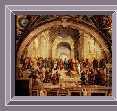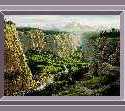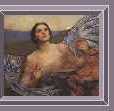In a World of Their Own
Guy Gavriel Kay
For sheer style and worldbuilding, there's very few who compare with Guy Gavriel Kay, whose credits also include a hand in compiling the Simarillion, as well as his own beautiful works.
Kay's forté is in the detail. He excells in taking actual world events, meddling with the geography and the history, and presenting a lavish plot with complex characters to romp over the sub-created earth. He tends to be rather indifferent in his religious world view, favoring no one belief, but presenting impassively what each separate character does. However, his works can be violent, and he almost always includes rather graphic sex scenes, which, although they frequently help the plot along, need not be quite so detailed.
His contribution to Fantastic Fiction is extensive, and any connosieur of Fantasy ought to read him once they are older and grounded in the Faith. Most of his books can stand alone, all are of a goodly length, often the middle two-hundred pages sag.
The Fionavar Tapestry Trilogy
The Summer Tree
The Wandering Fire
The Darkest Road
Literary Quality:Several university students from this world are whisked to the "first world," Fionavar, which is threatened by the Unraveller. Combining original and Arthurian legend, they must each discover who they truly are and where they truly belong. Most likely the weakest of his novels, best read after one of his other stand alones. Includes some sex, and an unsatisfactory ending to the Arthur myth: (curious Barneyesque menage-a-trois with the three of them floating off to somewhere in perfect love and harmony. Odd, to say the least).
Christian Morality: Harmless/Dangerous
Age Appropriateness: Adult
Literary Quality:One of his most interesting books in terms of thought, Tigana chronicals one nation's struggle to regain their place in a world that cannot even hear their name. Includes a small scene of incest, and one of bondage - the latter easily skipped or even blacked out with a pen.
Christian Morality: Harmless/Dangerous
Age Appropriateness: Adult
Literary Quality:A study in the effect of music and poetry upon the world, A Song for Arbonne follows a mercenary as he is called upon to save a nation from northern invaders. Confusing ending, sexual scenes easily skipped over (the majority of these latter are during the sections dealing with the villain, whose tastes are perverted and whose sections - helpful! ; ) - are written in the present tense).
Christian Morality: Harmless/Dangerous
Age Appropriateness: Adult
Literary Quality:Based loosely on El Cid, The Lions of Al-Rassan is a wonderful character study of two good men on opposite sides of the battle line. Some unnecessary sexual scenes, gripping plot.
Christian Morality: Harmless/Dangerous
Age Appropriateness: AdultThe Sarantine Mosaic Duology
Sailing to Sarantium
Lord of Emperors
Literary Quality:I've not read these yet - feedback would be appreciated!
Christian Morality: Harmless/Dangerous
Age Appropriateness: Adult
Paula Volsky
A little known author, but invaluable to the genre of fantasy. Her worldbuilding is exquisite, taking the creation of another place entirely to the edges, sometimes to the story's detriment, frequently to the connosieur's delight. Her stories are generally free from sex, but they are not free from graphic violence and edge-of-your-seat suspense. Her earlier novels tend to be completely indifferent to religion altogether - her characters work in a more or less moral world with no thought to a higher power - but her more recent books have shown discouraging trends towards "astral spirits," "celestial excrement," and "planar gods" as well as an increasing amount of horrific torture.
The Curse of the Witch-Queen
Literary Quality:Her first novel. The headstrong son of the Duke of Szar insults a Sorcerer-King, and is punished by an insatiable appetite which eventually turns him into a giant. The only way to return to his original size is to serve the King, which includes going on a perilous quest to find the Witch-Queen to save the King's daughter. Slow-reading, mild horror.
Christian Morality: Harmless
Age Appropriateness: Teenager/AdultThe Fal Ghrizni Trilogy
The Sorcerer's Lady
Literary Quality:The Lady Verran is married to the Sorcerer fal Ghrizni whose pride and misanthropy bring destruction upon his house and threat to the land. Terribly exciting, works as a stand-alone.
Christian Morality: Harmless
Age Appropriateness: TeenagerLiterary Quality:The son of the Lady Verran and the Sorcerer fal Ghrizni has lived his whole life among the harmonious Vardruls, and - spurrining the violent tendencies of his human nature - longs to become one of them, despite his mother's pleas to the contrary. Difficult to read: Volsky creates a completely alien civilisation.
Christian Morality: Harmless
Age Appropriateness: Teenager
Literary Quality:The Vardrul decendent of Lady Verran and fal Ghrizni's son combats his own kin, the decendent of Lady Verran and an explorer, in a struggle over fal Ghrizni's dying curse on Lanthi Ume. An adequate wrap-up to the series.
Christian Morality: Harmless
Age Appropriateness: Teenager
Literary Quality:Relian Kru has the worst luck possible. On the run from a fanatic Court Assassin for dressing badly, he ends up the slave to the sorcerer Krepose Gavayne, whose love of self leads him to multiple clonings. Relian's dilemma is further complicated when he falls in love with a fellow captive, whom he must also rescue. Strange in parts, scary in others, good overall.
Christian Morality: Harmless
Age Appropriateness: Teenager
Literary Quality:Absolutely gripping. The French Revolution meets the Bolshevik uprising in this incredibly complex and fascinating plot. The Exalted Eliste goes from the debauchery of the Vonahrish Court to the gutters of the city, in a story of self-discovery and political upheaval. Scary in parts, sexual possibilities (i.e., she's propositioned) mentioned.
Christian Morality: Harmless
Age Appropriateness: Teenager
Literary Quality:Prince Varis, sick of the hypocritical and cruel court, takes refuge in his solitary palace. But isolation soon leads to boredom, and from there to a study of necromancy. The vile art warps his brain and ambition, and soon after he employs his "talent" to kill his brothers and take the throne for himself. Only his nephew and niece escape the massacre, fleeing to another country altogether, where Shalindra falls in with those who have the power to defeat her uncle. Frightening in parts, gruesome in others, possibility of uncle/niece incestual attraction (which actually would have been very interesting if expanded), unsatisfactory ending, but gripping overall.
Christian Morality: Dangerous
Age Appropriateness: Teenager/Adult
Literary Quality:Returning to the Vonahrish people from Illusion, Volsky takes on the ethical question of pseudo-English colonisation of a pseudo-India. The hero, Renille, is sent to destroy the country's religion by killing its high priest. Adventure and action ensue, awkwardly and episodically written with a love story tacked on. Disturbing in its religion; Volsky begins her "astral excrement" idea of "planar gods."
Christian Morality: Dangerous
Age Appropriateness: Adult
Literary Quality:In a distinctly un-Volskyish-feeling world, our author recreates something akin to "The Count of Monte-Cristo" - but with considerably more graphic horror, and considerably less character development. Organised religion is the baddy, and again, "astral excrement" and "planar gods" are employed in an unsatisfactory Faust-like manner.
Christian Morality: Dangerous
Age Appropriateness: Adult
Teresa Edgerton
Another incredible worldbuilder, and little known author (hmmm, am I sensing a trend?), Teresa Edgerton is unique in the field for her attempted impartiality in her religious set-ups as well as her complex characters, gripping plot, and emminent rereadability. At the moment, she has two world set-ups, one in a recently Christianised pseudo-Celtic world, and the other in an 18th century that never was. Rumour has it that another novel, also set in the swashbuckling 1700's is due out in 2001. Perchance - oh please - the success of that book will cause a reprint of her others?
The Green Lion Trilogy
Child of Saturn
The Moon in Hiding
The Work of the Sun
Literary Quality:Teleri ni Pendaran, the Wizard's apprentice, must face her own fears, as well as the machinations of the villainous witch, Princess Diaspad, with the help of a young knight, Ceilyn mac Cuel. Involves some intimations of sexual relationships; author attempts and partially succeeds in showing Christianity (specifically Catholicism) as holy. Jam-packed with plot, characters, and excellent Medieval worldbuilding.
Christian Morality: Harmless
Age Appropriateness: Teenager/AdultThe Castle of the Silver Wheel Trilogy
The Castle of the Silver Wheel
The Grail and the Ring
The Moon and the Thorn
Literary Quality:Tryffin fab Maelgwyn of Gwengelli, sometime govenor of Mochdreff, saves his young cousin, Gwenlliant, by marrying her. However, Gwenlliant has the wild power within her, which is untrained. Struggling between their new marriage, the mysterious grudge of the Mochdreff against the Gwengellach, and a terrible shapechanger from the shadow lands of Mochdreff's past, Tryffin and Gwenlliant find a refuge in each other. Generally good morals, more sexual content discussed than might be appropriate, most sympathy with paganism than the first series. Still, an admirable effort to portray Catholic Christianity as holy. Exciting plot overall.
Christian Morality: Harmless/Dangerous
Age Appropriateness: Teenager/AdultThe Goblin Moon Duology
Goblin Moon
The Gnome's Engine
Literary Quality:Meet Lord Francis Love Skelbrooke, a cross between Errol Flynn and the Scarlet Pimpernel, whose adventures through this exaggerated 18th century Europe and New World will delight the reader and flutter the heart. Edgerton's worldbuilding is excellent here, the violence and sexual tension kept to a pleasant yet exhillerating minimum. The conclusion at once startling and satisfactory. Those with a grounding in the "ideals" of the Endarkenment will find Edgerton's extrapolation of that time an interesting study in what might have happened had the French Revolution had their way universally - especially in regards to religion. Altogether thrilling.
Christian Morality: Harmless
Age Appropriateness: Teenager/Adult
Kate Elliott
Kate Elliott is generally hailed as an excellent worldbuilder. Her Jaran novels (science fiction, unread, input requested), seem to garner such adjectives as "original," "intricate" and the like. And on these laurels, Elliott turned her sights towards a quasi-Medieval world in her series, Crown of Stars.
The first book, The King's Dragon (Literary Quality:  ; Christian Morality: Dangerous; Age Appropriateness: Adult) seemed harmless enough. The plot was good, as was the initial worldbuilding, and the characters seemed interesting enough - in fact, the mystery of the plot was so interesting, that one brushed over the sexual torture the bad guy (who's supposed to be a priest) imposes on the heroine, and the fact that the rip-off of the Catholic Church has been inverted so that women are in dominance over men. Her second book, though, Prince of Dogs (Literary Quality:
; Christian Morality: Dangerous; Age Appropriateness: Adult) seemed harmless enough. The plot was good, as was the initial worldbuilding, and the characters seemed interesting enough - in fact, the mystery of the plot was so interesting, that one brushed over the sexual torture the bad guy (who's supposed to be a priest) imposes on the heroine, and the fact that the rip-off of the Catholic Church has been inverted so that women are in dominance over men. Her second book, though, Prince of Dogs (Literary Quality:  ; Christian Morality: Offensive; Age Appropriateness: Inappropriate), not only brings these two elements to the forefront (including one male character who's forced into the convent!), but also includes a good amount of potty humour, unbridled lust, pro-paganism, and rotten literary merit.
; Christian Morality: Offensive; Age Appropriateness: Inappropriate), not only brings these two elements to the forefront (including one male character who's forced into the convent!), but also includes a good amount of potty humour, unbridled lust, pro-paganism, and rotten literary merit.
Elliott obviously has the makings to be a really good fantasy writer. Her interviews are generally helpful, and the research she's done for worldbuilding generally impressive. However, her insistence on perverting not only the Church (female dominance, opressive/restrictive, uniformly licentious and/or fanatic), as well as Her Doctrines (goddess not God, Christ-figure ONLY human), work against both her literary merit as well as her moral qualities.
Overall, her fantasy ranks thus:
Literary Quality:
Christian Morality: Offensive
Age Appropriateness: Inappropriate
Ellen Kushner
The award-winning authoress of Thomas the Rhymer, Kushner was suggested to me by someone who knew my love for Fantasies of Manners. Naturally, I then bought her Swordspoint, which looked to be another version of 18th century Europe. However, what I found was poor worldbuilding, sadistic characters, insipid plot, and - worst of all - rampant homoeroticism. I can say with pleasure, that Kushner has the honour of having written the first book I have ever literally torn up and thrown away.
Literary Quality:
Christian Morality: Offensive
Age Appropriateness: Inappropriate
 |
 |
 |
 |
 |
(c) 2000
Updated 19 June, 2000
All Rights Held by the Author.
No part of these pages may be used or copied without express permission of the author.



